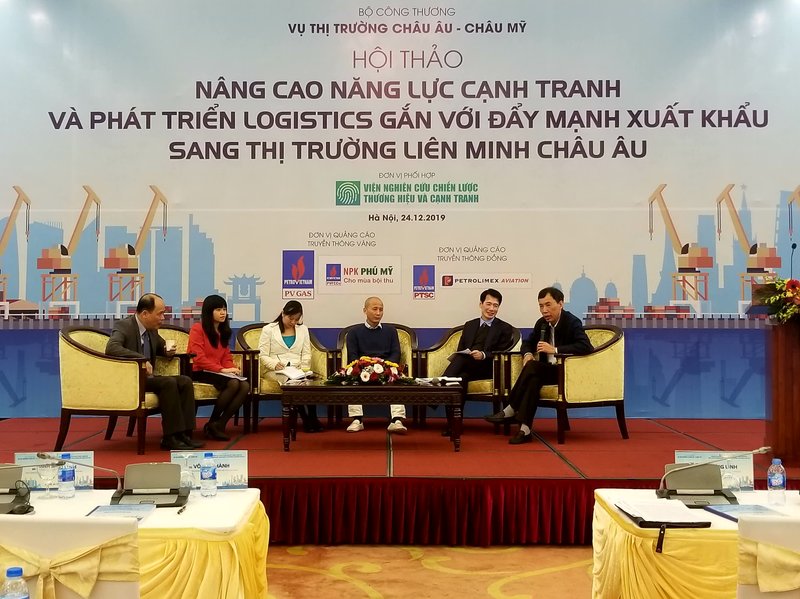Vietnam logistics firms pressured to grow or face being taken over in EVFTA era
Vietnam’s targets of becoming Asia’s logistics hub would only be feasible if local firms can fence off competition from the world’s major logistics players.
Once the EU – Vietnam Free Trade Agreement (EVFTA) comes into force, European investors are entitled to purchase up to 51% stakes in Vietnamese logistics firms, putting them under two options: to grow or being taken over, said Nguyen Canh Cuong, trade counsellor at the Vietnamese Embassy in the UK.
| Overview of the conference. Source: Hai Yen. |
“Alongside new opportunities, it is inevitable that Vietnamese firms would face fiercer competition from major logistics players in Europe right in their home soil,” said Cuong at a conference discussing the impacts of the EVFTA on Vietnam’s logistics sector on December 24.
“A trade deal with the EU is a huge boost for Vietnam’s exports, particularly as the deal is the EU’s first of its kind with a developing country in Asia,” Cuong added, saying more imports are predicted to come with tariff reductions and growing disposable income in Vietnam.
This sets a perfect context for the local logistics sector to grow, with “more goods to transport, more customers and more investments,” Cuong added.
Eventually, the sector would benefit from greater foreign investment inflow and advanced corporate governance methods, he stated.
In this context, Cuong expected local logistics firms to prepare for competition through investing in technologies and infrastructures, upgrading corporate governance capabilities and services qualities.
Cuong suggested merger should be a viable option to form new businesses with higher competitiveness.
Regarding the issue, Ta Hoang Linh, director of the European – American Market Department under the Ministry of Industry and Trade (MoIT), said the EU would require an advanced logistics chain to ensure the preservation of quality and freshness of goods and products transported to its 512-million market .
This is particularly important for Vietnam as the country’s export staples to the EU are agricultural, craft and wooden products, while the EU is Vietnam’s second largest export market with a 13.6-fold increase in bilateral trade turnover in in the 2000 - 2018 period, from US$4.1 billion in 2000 to US$55.8 billion in 2018.
Linh said Vietnam’s target of becoming one of Asia’s logistics hubs by 2025 would only be feasible if Vietnamese firms can fence off competition from European logistics firms, particularly those leading companies in the field from the Netherlands and Belgium.
“More systematic investments are needed to enhance competitiveness of local firms, which should come from not only these companies themselves, but also from the government,” Linh stated.
A report from the Vietnam Chamber of Commerce and Industry (VCCI) showed the domestic’s logistics sector recorded growth rate of 12 – 14% annually over the last few years, reaching annual revenue of US$40 – 42 billion and contributing 4 – 5% of the GDP.
As of present, Vietnam has 30,000 logistics companies, an increase from 23,000 in 2016, including 4,000 operating in domestic and international cargo transportation.
Local logistics firms, mostly small and mediumsized, are holding 23 – 30% of the market share, while the remaining share belongs to around 30 multinational peers.
In 2018, Vietnam ranked 39th out of 160 countries and territories in the World Bank’s Logistics Performance Index (LPI), up 25 places from 2017, and only behind Singapore and Thailand in ASEAN.
The World Bank estimated by 2030, the CPTPP would help boost Vietnam’s GDP growth by 1.1 – 3.5 percentage points, resulting in an increase of 4.2 – 6.9% in exports and 5.3 – 7.6% in imports.











